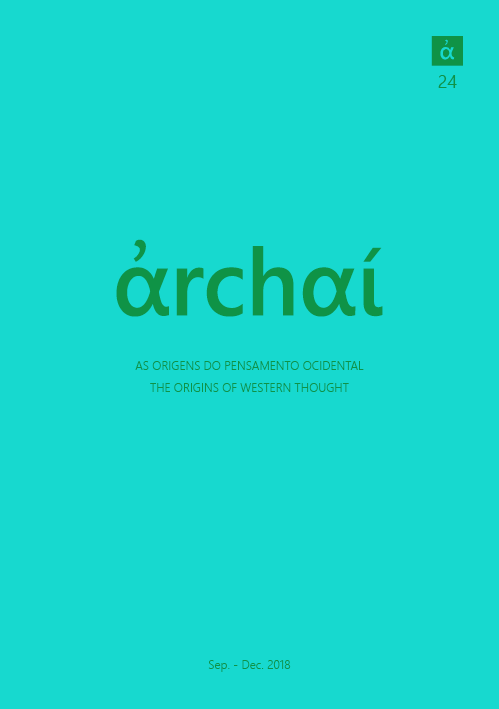The characterization of the sphere of temperance in EN III.10
DOI:
https://doi.org/10.14195/1984-249X_24_7Keywords:
Aristotle, Nicomachean Ethics, temperanceAbstract
Our article deals with Aristotle’s account of the sphere of temperance (σωφÏοσÏνη) in the Nicomachean Ethics. The goal is to provide a detailed analysis of NE III.10 in order to identify the difficulties this chapter presents us with and to introduce and discuss the interpretations set forth by the secondary literature. Of special interest to us are Aristotle’s intense dialogue with Plato; the difficulty in understanding touch as the most common of the senses and Aristotle’s severe judgment of the pleasures of the sphere of temperance. In short, Aristotle seems to set out from platonic thesis and notions only to distance himself from them by introducing his own, associating temperance with the most common of the senses, namely, the sense of touch. This association is not based, as it could seem prima facie, on a merely empirical observation but on the assumption that touch is the most fundamental and necessary sense for humans and animals alike. Temperance, therefore, as the excellence in the relation with the most fundamental and necessary of the senses, seems to be a pre-condition for rational action. From this Aristotle derives the etymology of the term, as the one who preserves practical reason (ὡς σῴζουσαν τὴν φÏόνησιν). This hypothesis would explain why Aristotle seems to engage in apotreptic language to characterize the lack of temperance, that is, the vice of intemperance (ἀκολασία) ”“ something we do not find the in the account of any other virtue and vice.
Downloads
References
BEKKER, I. (ed.) (1831-70). Aristoteles. Opera Graece. Berolini, apud Georgium Reimerum.
BROWN, T. (1646) Pseudodoxia Epidemica: or, enquiries into very many received tenets and commonly presumed truths. (6th ed. 1672) Disponível em: <URL = http://penelope.uchicago.edu/pseudodoxia/pseudodoxia.shtml>. Acesso em: 1 janeiro de 2017.
BURNET, J. (ed.) (1900). Aristotle. The Ethics of Aristotle. London, Methuen Co.
BYWATER, I. (ed.) (1894). Aristotelis. Ethica Nicomachea. Oxford, Oxford University Press.
CURZER, H. J. (2012). Aristotle and the Virtues. Oxford, Oxford University Press.
GAUTHIER, R. A.; JOLIF, J. Y. (1970). Aristote. L’ethique a Nicomaque (introduction, traduction et commentaire). Paris, Publications Universitaires.
GRANT, A. (1885). The Ethics of Aristotle. London, Longmans, Green and Co.
HUTCHINSON, D. S.; JOHNSON, M. R. (2014). Protreptic Aspects of Aristotle’s Nicomachean Ethics. In: POLANSKY, R. (ed.). The Cambridge Companion to Aristotle’s Nicomachean Ethics. New York & Cambridge, Cambrige University Press.
INWOOD, B.; WOOLF, R. (eds.) (2013). Eudemian Ethics. Cambridge, Cambridge University Press.
JOHANSEN, T. K. (1997). Aristotle On The Sense-Organs. Cambridge, Cambridge University Press.
LOUIS, P. (ed.) (1956). Aristote. Les parties des animaux. Paris, Les Belles Lettres.
MUNIZ, F. (2012). Platão. Filebo (tradução, apresentação e notas). Rio de Janeiro, Editora PUC RIO.
NATALI, C. (1999). Aristotele. Etica Nicomachea (traduzione, introduzione e note). Roma & Bari, Editori Laterza.
NATALI, C. (org.) (2009). Nicomachean Ethics Book VII - Symposium Aristotelicum. Oxford, Oxford University Press.
NATALI, C. (2007). Rhetorical and scientific aspects of the Nicomachean ethics. Phronesis 52, p. 364-381.
NATALI, C. (2013). Aristotle: His Life and School. Edited by D. S. Hutchinson. Princeton, Princeton University Press.
NORTH, H. (1966). Sophrosyne, Self-Knowledge and Self-Restraint in Greek Literature. Ithaca & NY, Cornell University Press.
NUSSBAUM, M. (1988). Non-Relative Virtues: An Aristotelian Approach. Midwest Studies In Philosophy 13, p. 32-53.
OLSON, S. D. (ed.) (2007). Athenaeus. The Learned Banqueters (translation) Loeb Classical Library. Cambridge, Harvard University Press.
PEREIRA, M. H. R. (2008). Platão. República (introdução, tradução e notas). Lisboa, Fundação Calouste Gulbekian.
PUENTE, F. R. (2000). O φιλόμυθος e o φιλόσοφος. Kriterion 102, V. XLI, p. 128-135.
REIS, M. C. G. (2006). Aristóteles. De Anima (tradução e comentários). São Paulo, Editora 34.
SISKO, J. E. (2003). Taste, Touch, and Temperance in Nicomachean Ethics 3.10. Classical Quarterly 53, p. 135-140.
STEWART, J. A. (1892). Notes on the Nicomachean Ethics of Aristotle. 2 vols. Oxford, Claredon Press.
SUSEMIHL, F. (ed.) (1903). Aristotelis. Ethica Nicomachea. Revisado por Otto Alpet. Lepzig, B. G. Teubner.
SUSEMIHL, F. (1935). Eudemi Rhodii Ethica. Leipzig, B. G. Teubner.
TAYLOR, C. C. W. (2006). Aristotle. Nicomachean Ethics: Books II ”“ IV (translation and commentary). Oxford, Oxford University Press.
YOUNG, C. M. (1988). Aristotle on Temperance. The Philosophical Review 97, n. 4.
ZINGANO, M. (2008). Aristóteles. Ethica Nicomachea: I, 13 ”“ III, 8: Tratado da Virtude Moral (tradução e comentário). São Paulo, Editora Odysseus.
Downloads
Published
How to Cite
Issue
Section
License
Given the public access policy of the journal, the use of the published texts is free, with the obligation of recognizing the original authorship and the first publication in this journal. The authors of the published contributions are entirely and exclusively responsible for their contents.
1. The authors authorize the publication of the article in this journal.
2. The authors guarantee that the contribution is original, and take full responsibility for its content in case of impugnation by third parties.
3. The authors guarantee that the contribution is not under evaluation in another journal.
4. The authors keep the copyright and convey to the journal the right of first publication, the work being licensed under a Creative Commons Attribution License-BY.
5. The authors are allowed and stimulated to publicize and distribute their work on-line after the publication in the journal.
6. The authors of the approved works authorize the journal to distribute their content, after publication, for reproduction in content indexes, virtual libraries and similars.
7. The editors reserve the right to make adjustments to the text and to adequate the article to the editorial rules of the journal.



